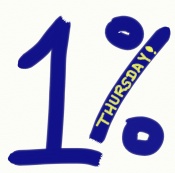1% Thursday: Magnesium
Consider talking to your doctor about magnesium supplements.
This won’t be anything new for regular readers of our site. But magnesium supplements have been such a help to so many people, they just had to make it into 1% Thursday eventually! 🙂
We won’t rehash everything that’s been said about magnesium already. But in summary, magnesium for migraine is one of the best researched, most helpful supplements out there. There are certainly various reasons to be concerned about magnesium levels in migraineurs. For example, magnesium may be low in women with premenstrual symptoms. Also, magnesium regulates is involved in many of the body’s functions that seem to suffer during a migraine attack (such as sleep regulation). Read more about the magnesium and migraine connection.
Magnesium is often taken alone, or as a part of a supplement such as MigreLief.
We’ve talked a great deal about the type of magnesium to take, how much to take, and what to not take it with (ie calcium!). So check out these previous posts for all the details:
Migraine and Magnesium – new study
Magnesium: Top of the List for Migraine
What is 1% Thursday?
 |
Every Thursday at Headache and Migraine News (weather permitting) we’ll talk about one measurable, practical thing we can do to make our lives just 1% better. Usually it will be something very easy, sometimes it will be a challenge. Let us know if you try it, or share an idea of your own – and maybe a year from now we’ll see that things have really changed for the better!

12 February 2010 @ 11:38 am
I just ordered a bottle of Quantum MigraLief and What Your Dr May Not Tell You … via Amazon. You’ll get the credit for the book if I did it correctly. 🙂 You’d get the credit for the supplement too, but your link points to another label of MigraLief that is not available via Amazon anymore. (You should fix that.) 😉
My migraines seemed under control for a while. I was only getting them once a month. Now they are coming every other day (again). My migraines are of the “silent” variety (though they don’t feel so silent to me) and I hope the MigraLief addresses the CSD that some seem to think causes all my symptoms.
Any input in this area?
12 February 2010 @ 4:26 pm
Carolyn Dean MD, ND, author of numerous books including “The Magnesium Miracle†and Medical Director of the Nutritional Magnesium Association http://www.nutrtionalmagnesium.org has this additional information to share that I thought you and your readers may find useful.
1. Nutritional Magnesium prevents platelet aggregation, which helps to avoid the thickened blood and tiny clots that can cause blood vessel spasms and the pain of a tension headache.
2. Magnesium relaxes the head and neck muscle tension that makes tension headaches worse.
3. Magnesium, vitamin B2, and the herb feverfew are an important tension headache treatment combination.
4. Magnesium is known as the anti-stess mineral and can alleviate stress, depression, anxiety and insomnia.
5. Hypoglycemia – The brain becomes extremely vulnerable to excitotoxins during episodes of low blood sugar or hypoglycemia. Pound for pound, the brain uses more blood sugar than any other part of the body. Low blood sugar occurs when you are malnourished or even when you skip meals. It also occurs in individuals whose adrenal glands are depleted and can’t mount the necessary adrenaline response to raise blood sugar when it gets too low. Magnesium is responsible for balancing blood sugar. With sufficient magnesium and balanced meals to prevent low blood sugar, you can protect yourself against headaches, attention deficit hyperactivity disorder, mood disorders, and even premenstrual tension. Supporting the brain as much as possible with safe nutrients and a safe environment, you may never need the brain-altering medications that are prescribed for these disorders.
6. One of the most absorbable forms of nutritional magnesium is magnesium citrate powder which can be taken with hot or cold water and can be found in most health food or vitamin stores.
For more information contact The Nutritional Magnesium Association http://www.nutritionalmagnesium.org
15 February 2010 @ 6:14 am
I haven’t been on magnesium since my migraines have been bad – I might look into that. When I had other problems before the migraines added to the list though I found that it helped a lot with restless legs and myoclonic jerks. Maybe relevant to some people since I noticed restless leg syndrome was on the “often comorbid” list.
And thanks Boris, I’ll look at that website too.
15 February 2010 @ 3:33 pm
I’ve been on Mg supplement since October and I am not letting go of it. It didn’t stop me from having my attacks, but I am a bit “useful” now than before and the nauseous feeling is lesser so I vomit lesser, too. I found this Magnesium in syrup form—Floradix Magnesium! Tastes like tropical fruits with honey so I don’t have to take those large chewable tables.
30 December 2010 @ 12:29 pm
The only problem I had with magnesium was a rear end one, no matter how I took it untiI I started using Epsom Salts (magnesium sulphate) dissolved in hot water and bathing my feet and hands. No side effects and always effective at reducing intensity of pain again and again as much as you like. I also now use turmeric for its anti inflammatory property again without any side effects. The important thing is the repeated use without side effects over years.